EILAT, Israel—The auditorium at the four-star Aria hotel in Eilat was packed with excited children and their parents. Lights flashed on the stage as the kids danced and sang along with a DJ and singer who roused the crowd. At the side of the room was a row of tables with 253 large boxes of Legos—one for each child to take back to their room.
In the back stood a group of adults, most smiling softly. Some were crying.
“I heard that the children are smiling,” a woman named Anat from a small community near the Gaza border told Chabad.org. “So I came running to see. They haven’t smiled like this since before that Shabbat.”
After the Oct. 7 terror attack on Israel, 70,000 people, including 16,000 children, from the communities closest to Gaza in the south and from Kiryat Shmona in the north were brought to Eilat for safety. They were given accommodations in the city’s many hotels, with residents sheltering together mostly by community of origin.
The Aria Hotel primarily hosts residents from the Moshav Yesha and Mivtachim, two neighboring agricultural communities in the Gaza envelope with beautiful greenery where the children would spend most of their days running around and biking outside. On this particular Sunday, Chabad-Lubavitch of Eilat organized an evening of music and fun for the displaced children from the moshavim, including the toys.
The men, women and children of Moshav Yesha and Mivtachim have been through a lot. On Oct. 7, the small security teams from both moshavim banded together to battle the large group of Palestinian terrorists invading their communities. The battle pitted the communities’ lightly-armed security volunteers against throngs of terrorists firing machine-guns and RPGs, and took place on the roads leading into the communities and inside as well. The volunteers fought valiantly for nearly 12 hours while locals hid in their bomb shelters. While the moshavim avoided the terrible fate of nearby Nit Yitzhak and Holit, which both suffered massacres, five of their members and two visitors were killed by terrorists. The communities, and especially the children, were left in mourning and extreme trauma.
During the kids’ program at the hotel, Anat left the room and quickly returned with her own son. “He is on reserve duty in the north,” she said. “But he was allowed to visit me for the first time in 50 days. Now I told him he must come see that the children are laughing. It will give him strength to continue.”
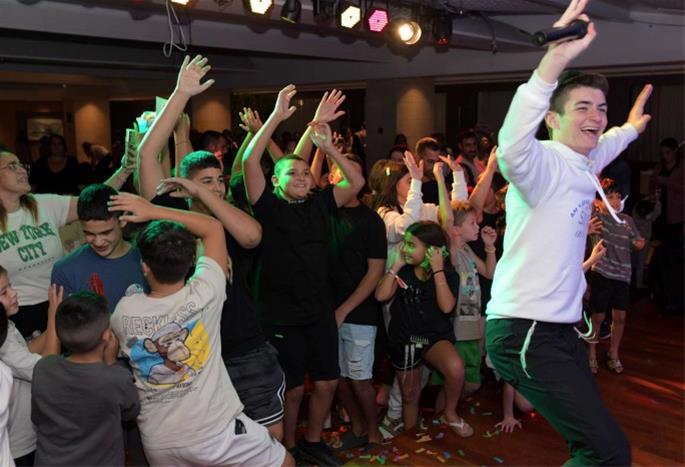
A Tourist City With No Tourists
The chief rabbi of Eilat, Rabbi Yosef Hecht, was sent to Israel’s southernmost city in 1977 by the Rebbe—Rabbi Menachem M. Schneerson, of righteous memory. In 1996, Rabbi Mendi and Chani Klein established Chabad of Eilat, and today there are 12 Chabad-Lubavitch emissary couples serving residents, visitors and Israel Defense Forces stationed year-round at eight nearby military bases. The number of soldiers in the region has more than doubled since the start of the war with Hamas two months ago.
“It’s actually one of the poorest cities in Israel,” Rabbi Klein explains. “There’s no industry aside from tourism, and the hotels aren’t owned by the locals.” One of the Chabad center’s busiest operations is a soup kitchen, which caters to hundreds of hungry people every day. Since the war broke out and the tourists stopped coming, the soup kitchen has been even busier. People in Eilat have learned that they can turn to Chabad when they are in need.
Walking down the streets of Eilat with Rabbi Klein gives the impression that every local, young and old, is his friend, as they each make sure to wave and say, “Shalom, Rabbi Mendi!”
Before each holiday, Rabbi Klein visits every public school in Eilat and brings a Jewish educational program to each class. The Chabad center bustles with activity, from Torah classes and bar mitzvah lessons to holiday events and Shabbat services and kiddush.
That was before the war.
In the days after Oct. 7, Eilat became an emergency landing spot for tens of thousands, and it was only natural for the management of various hotels to turn to the Kleins for help.
“In the beginning, everyone was flooding to help the displaced families—people were coming to volunteer, they were bringing donations,” the rabbi explains. “But it all dried up. The locals aren’t able to help more, the volunteers went home, and now everyone turns to us.”
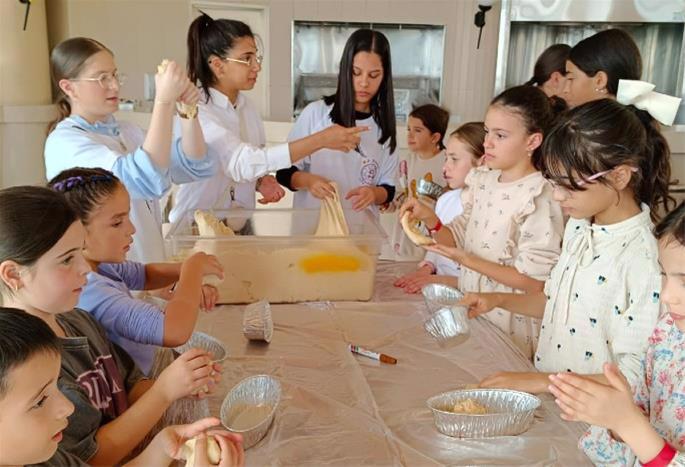
From Washing Machines to Playgroups
One of the first problems that Chani Klein noticed was clean clothing. Hotels aren’t designed for families with children to stay long-term and do consistent laundry. In one hotel with 250 families, she noticed a never-ending waitlist to use its three washing machines.
“It’s something so simple that nobody thinks of,” she says. “But here are people who experienced a huge trauma, and had to leave their homes and jobs and all their belongings, and they just want to give their kids clean clothing to wear, but they can’t!”
So the Kleins facilitated a donation, and soon, the hotel had five washing machines installed on every floor. The small, thoughtful action triggered a domino effect; parents were so grateful that word spread, and the city got moving and installed more washing machines in all the hotels for use by displaced people.
“We want them to know that we care about them,” says Chani Klein. “Basic needs, like washing machines, are spiritual. A family cannot live without it.”
The social activities in hotels started in the second week after the war broke out. It began on a busy Friday afternoon when Chani Klein spoke with a mother from Sderot who confessed that she was breaking down from the struggle of keeping her kids busy when they weren’t in their own home, and while they were all in emotional distress still coming to terms with a severe trauma. Klein spontaneously told the mother that she was opening a playgroup in her home starting on Sunday.

Bedtime Prayers and Shema
After a few days, it became clear that the playgroup needed to be operated on a much larger scale. It could not be home-based, but a playgroup inside each hotel hosting displaced families, and with activities for every age. It started with a children’s activity and then a pre-Shabbat challah baking party in one hotel, and quickly grew from there. Now, Chabad of Eilat is providing programs to displaced families in 12 hotels with a menu of 11 different programs that hotel coordinators can choose from.
To keep the huge amount of programs going, 10 volunteers paid their own tickets and traveled from the United States to come help out—five young Chabad rabbis and five female leaders. The two teams split the tasks at hand, and directed by the Kleins, they got straight to work.
The most popular program is the “Good Deeds Club House,” which engages kids ages 6 through 12 with a daily hour-and-a-half of activities and crafts. Most importantly, the volunteers come back every day and build positive relationships with the children, showering them with much-needed love and attention.
Before bedtime, parents and children come down to the hotel lobby in pajamas for a night program. The youngsters gather around for an activity and then the lights go out, and each child holds a flashlight while listening to a bedtime story. Before going up to their beds, the group says the Shema prayer together.
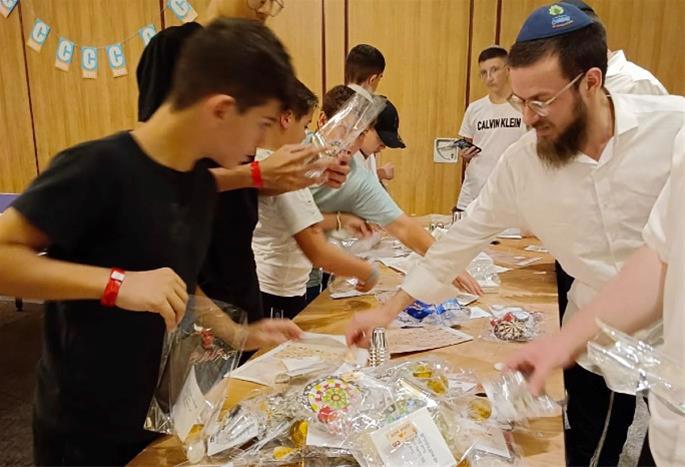
Programs for Women and Teens
At a Chabad of Eilat Women’s Circle meeting, some displaced mothers expressed their frustration and pain over not having their own kitchen, and being unable to cook the comfort foods that they and their children are used to eating. The next week, Chabad arranged for the weekly gathering to be held at an industrial kitchen—with all the ingredients that the women requested to cook exactly the dishes they wanted—in a supportive atmosphere together with friends.
In perhaps the most urgent project, the young rabbis are opening CTeen clubhouses for the displaced teenagers in the hotels. “Often, nobody knows where the teens are,” Chani Klein explains. “It’s not a good situation.”
The teens of the Gaza Envelope communities came face to face with the horrors of the Oct. 7 attack, witnessing the cruel murder or kidnapping of their friends at an age where they might not be allowed to read about such things in a book. Then they were whisked off from their homes with no time to pack and placed into small hotel rooms in an unfamiliar environment, with no steady school to attend. Many of them sleep all day and then disappear all night into the streets of downtown Eilat.
When asked about her teenage children, one mother told Chabad.org: “They stay in their room. My daughter doesn’t believe she is allowed to be happy until all of her friends return.”
The first CTeen clubhouse opened in the Queen of Sheba Hotel, which primarily hosts families from Sderot. The second was opened in the Aria Hotel for the children of the aforementioned Moshav Yesha and Mivtachim, and more are in the works. The clubhouses open after 9 p.m., and are staffed by the young rabbis and volunteer IDF soldiers until past midnight. In it, you’ll find the teens playing ping pong, foosball, PlayStation and card games, or volunteering to pack supplies for activities for the younger children—something that gives them a sense of purpose and control.
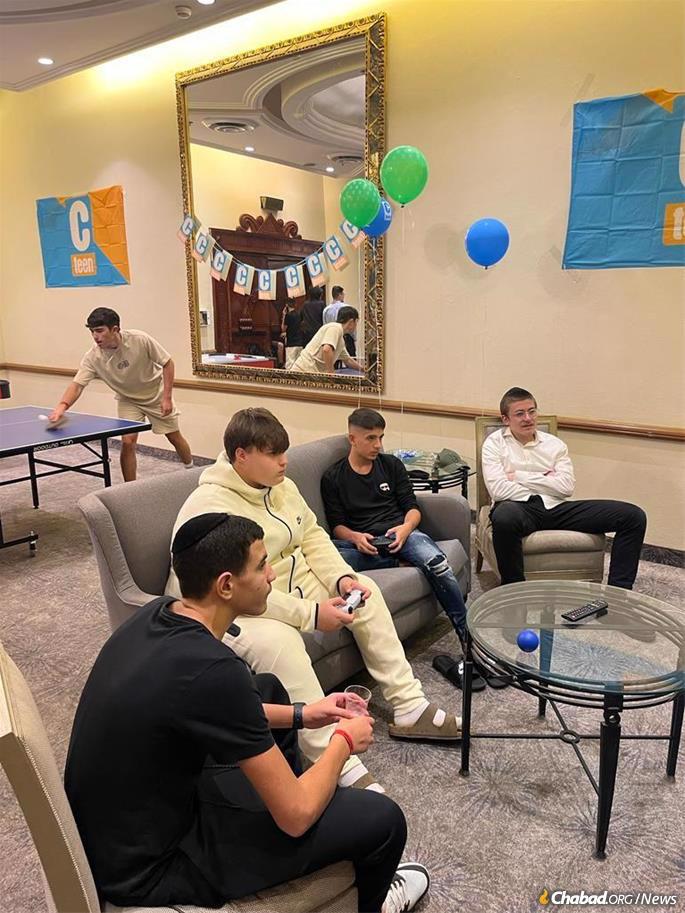
The Emotional Importance of Support From Around the World
While the thousands of displaced families struggle with a painful new reality and unclear path ahead, Chani Klein believes that it’s important that they feel the love of the Jewish people and their supporters around the world.
Chabad of Eilat organized the Sunday evening children’s event at the Aria with the help of the Efune family of Arizona. Brad Efune flew in from Arizona with gifts for soldiers and children affected by the war, including 500 toys for the displaced children in Eilat.
“We in America are thinking about you every day,” the donor told the Moshav members at the gathering. “We care about you and want the best for you.” Two young boys joined him on stage and took the microphone to share a few words.
“Thank you to the hotel staff who are so patient with us, even though we drive them crazy all day,” they began. The audience laughed, and the hotel manager teared up.

On Sunday evening, as Chani Klein welcomed parents and children to sing and dance and collect their gifts, she said: “You were the envelope of Israel, you have been living with self-sacrifice to guard the Land and People of Israel, and perhaps we did not appreciate it enough. Now it’s our turn to envelope you in our love and care, and do whatever we can in return.”
As the kids ran around excitedly with their new toys and high energy from dancing with Netanel Katz, an American-Jewish DJ whose program is called Simcha on Wheels, a woman named Aviva from a community bordering Gaza stood quietly in a corner in the back, her face filled with mixed expressions of sorrow and hope.
When asked how she was doing, she took a deep breath and spoke of how one of her sons was murdered by Palestinian terrorists on Oct. 7. “I say ‘Baruch Hashem’ (‘Thank G‑d’) because another one of my sons survived on that day,” she said. “I haven’t fallen into despair, and I think that’s because of the unity of the Jewish people. Everyone is holding us up together.”
A big strong hug for a visitor. A pause, and then she continued, “because you come here and share in my pain, I can have moments like this, and share in your joy.”
To help Chabad aid displaced families in Eilat visit their special fund page here.
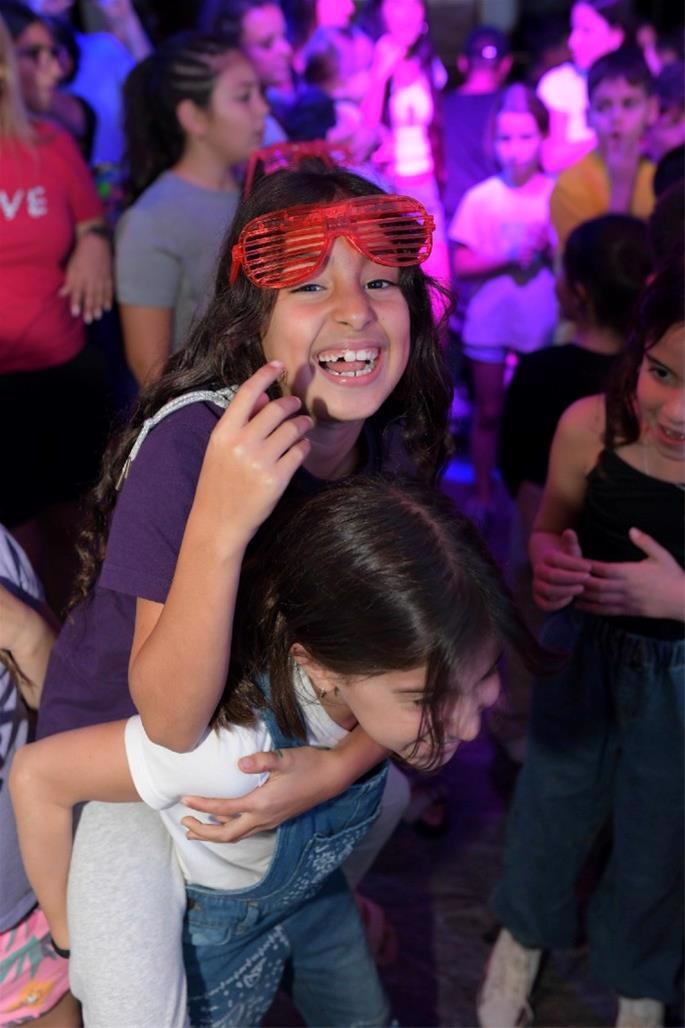









Join the Discussion